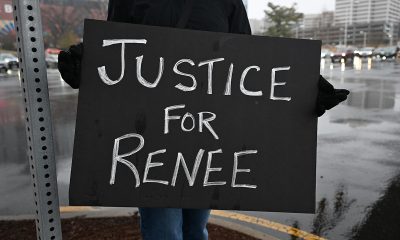Bolivia
Casa Trans Pamela Valenzuela is beacon of hope for LGBTQ Bolivians
Refuge, community center opened in La Paz in 2022

In a context where discrimination and exclusion continue to be a reality for Bolivia’s LGBTQ community, Casa Trans Pamela Valenzuela stands as a refuge and comprehensive support center for transgender people.
Casa Trans since it opened in 2022 has provided essential services that go beyond simple housing, offering legal, medical, psychological, and food assistance.
Located in the San Pedro neighborhood of La Paz, the national capital, Casa Trans opens each day, offering a soup kitchen where clients can prepare their own food. Anyone in need of a meal is welcome, although its main objective is to assist trans women and men.
Luna Humérez, president of the Organización de Travestis, Transgéneros y Transexuales Femeninas (Otraf) in Bolivia and director of Casa Trans, told the Washington Blade the project began to address needs the COVID-19 pandemic exacerbated. Many trans people found themselves homeless and without means to support themselves because of the loss of informal jobs or sex work.
Support from the Global Fund allowed Humérez and other activists to create a space that offers free food and shelter.
“What inspired the creation of the Casa Trans was post-COVID,” explained Humérez. “You know that in COVID there were many problems with the trans community, especially the Latino trans community, because they were doing sex work, they lived on a daily basis, they lived in rents, they could not go out to work. So, many suffered from housing and food issues. So, the creation of the Casa Trans was to mitigate a little and help the trans population with free food from Monday to Friday.”
The activist said the assistance that Casa Trans has been able to offer has expanded.
“The spaces have been expanded, a multidisciplinary care team has been expanded, from a social worker, a psychologist, an endocrinologist, a general practitioner, a legal advisor, a lawyer and the peer-to-peer work that we do,” said Humérez.
“The space has evolved too much and we are attending more and more cases and helping more and more people. And not only LGBT people, but also people in vulnerable situations,” she added.
LGBTQ people in Bolivia continue to face significant challenges in health, education, employment, and housing, despite some legal and social advances.
The First Virtual Survey of the country’s LGBTQ community, which the Ombudsman’s Office and the National Institute of Statistics conducted, found more than 60 percent of respondents said they have faced discrimination at some point in their lives. This mistreatment includes verbal and physical violence and exclusion in the workforce and the education system.
Thirty-three percent of respondents also said they do not have any type of health care; with sexual minorities and trans women the most vulnerable. Sixty-five percent of respondents said they do not know how to access Bolivia’s Unified Health System.
Humérez pointed out that “legislation in Bolivia and the rights of trans people have been improving over the years.”
“We have had a leftist government that, although it has done some things such as the Gender Identity Law and the Anti-discrimination Law, they have not been enough,” Humérez told the Blade. “At the moment the trans population in Bolivia does not have all the rights as the cisgender population. So, at this moment we are cut off from many things and we think it is important that we must keep fighting and fighting so that the state can recognize our full rights without any restrictions.”
Humérez said it is important for LGBTQ activists to participate in elections that will take place this year.
“I think it is important that we must be political actors in these new elections that are coming this year,” she said.

Casa Trans struggles to secure funding
Casa Trans not only offers a roof and food; but legal advice, specialized medical care in the transition process, psychological support, and job training opportunities. A multidisciplinary team — a lawyer, a social worker, a psychologist, and an endocrinologist — works to provide these services. Casa Trans also arranges scholarships for colleagues who wish to study at a university or technical institute.
“The challenges are complicated because we do not have direct funding,” said Humérez, who noted those who work with Casa Trans are volunteers.
She said U.S. President Donald Trump’s decision to freeze nearly all American foreign aid will make efforts to secure enough funding for Casa Trans even more difficult.
“Now with Donald Trump becoming president of the United States, I believe that many things will become more difficult, not only in the United States, but this will also affect the countries of the region, Latin America, among others,” said Humérez. “So, for us it is important that we have financial support so that our work can continue because the work we do is very important.”
The existence and work of the Pamela Valenzuela Trans House highlights the urgency of addressing the inequalities and discrimination faced by the LGBTQ community in Bolivia.

Bolivia
Trans Bolivian Senate candidate hopes to make history
Luna Humérez running to represent La Paz Province

Luna Humérez has made history in Bolivia as the first transgender woman to run for a seat in the country’s Senate.
“We are making history, my candidacy is a bet on human rights,” Humérez told the Washington Blade.
She hopes to represent La Paz Province under the banner of SÚMATE, a center-left political movement that includes presidential candidate Manfred Reyes Villa.
“It is important to occupy these spaces and demonstrate that beyond our identity we have the capacity,” said Humérez.
With a trajectory of more than 15 years as an activist for trans rights in Bolivia, Humérez is not a new figure in the public arena. A lawyer by profession and president of the Organization of Transvestites, Transgender and Transsexual Women of Bolivia known by the acronym OTRAF, she has been one of the main promoters of a trans rights law in the country. Humérez is also the first trans woman in Bolivia to enter into a civil marriage after authorities legally recognized her gender identity.
Humérez is the founder of Casa Trans Pamela Valenzuela, a refuge and community center in La Paz.
Aware of the need to advance protections for sexual and gender diversities, Humérez has proposed a legislative platform that focuses on the control and effective enforcement of laws.
“Bolivia is full of laws, regulations that are obsolete, however they have a mandatory compliance,” she said, noting reforms should improve accessibility and respond to marginalized groups’ specific needs.
Humérez’s platform is “full rights for all, regardless of their sexual orientation and gender identity.”
Facing a campaign from a historically marginalized identity, Humérez recognizes the resistance, but also celebrates the support.
“My candidacy also speaks of the fact that there is a large number of Bolivians who have been left behind because of discriminatory bias,” she told the Blade. “I have so many anecdotes, which began with those who trusted me, among them are my sisters in struggle, human rights activists, political activists, animal activists, environmentalists, and others with whom we formed ties, mostly young people who also have the desire to take flight and change the country for the better. They are my other family and I am very grateful to them.”
Humérez proposes, in addition to a gender rights and diversity agenda, a platform with seven focuses — legal, political, economic, productive, social, moral, and territorial — and five immediate actions. These include:
- An “immediate injection” of $10 billion to stabilize the economy and create the flow of dollars
- Reestablish order throughout the country; guaranteeing freedom of protest without interfering in economic development
- Create one million “decent and well-paid jobs” that would allow “talented young people” to remain in the country
- “Act firmly” against corruption
- “Promote real authority for each department” that would decentralize the government
Regarding LGBTQ youth in Bolivia, the lawyer and activist envisions a future where “the freedom that every human being has to choose their sexual orientation and gender identity with equal opportunities must be guaranteed.”
“I notice that the youth today understood this, and now it is necessary to have spaces of accessibility and participation without any consideration,” said Humérez. “The State must guarantee through its instances this accessibility. We need a Bolivia that is more plural, inclusive and in brotherhood.”
Humérez concluded the interview by noting her family’s humble beginnings.
“I know what deprivation is and I know what it is like not to have enough bread to put in one’s mouth,” she said. “If my life has been to help as many people as possible, being in there I will be able to help much more. I am an example of overcoming and showing that anything is possible. Do not judge me by my identity, but by my capacity.”
The country’s general elections will take place on Aug. 17.
-

 Colombia5 days ago
Colombia5 days agoGay Venezuelan opposition leader: Country’s future uncertain after Maduro ouster
-

 Opinions5 days ago
Opinions5 days agoDo not forget that Renee Good was queer
-

 Florida5 days ago
Florida5 days agoDNC slams White House for slashing Fla. AIDS funding
-

 Virginia4 days ago
Virginia4 days agoVa. Senate approves referendum to repeal marriage amendment

















